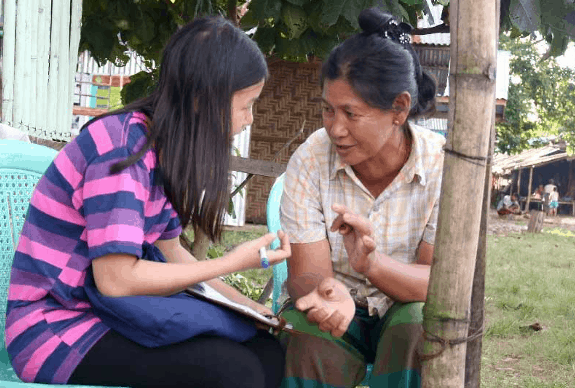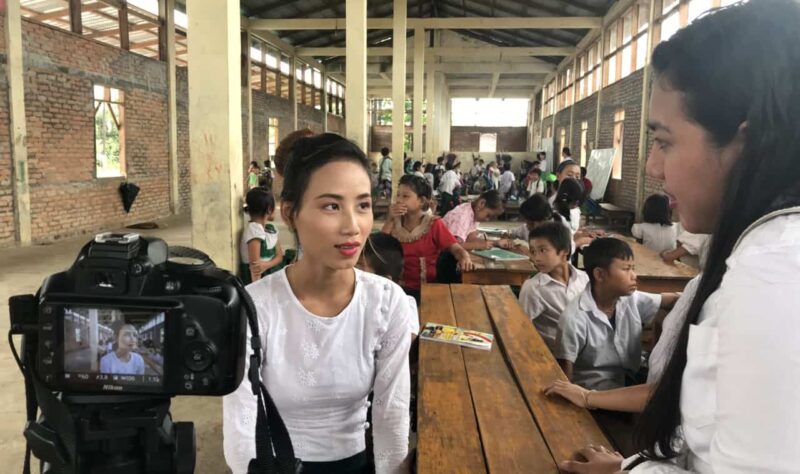For many around the world, it was a woman who first put Myanmar on their radar. A globally esteemed Nobel Peace Prize laureate, Aung San Suu Kyi’s rise to power in 2016 after 21 years in and out of house arrest, was viewed around the world as a win, not just for Myanmar, but for human rights more broadly. Her party, the National League of Democracy (NLD), promised to uphold these fundamental rights and guide the country towards a full democratic transition.
With a potential second term of NLD rule after the November 8th elections, the people of Myanmar are asking: exactly how much has Aung San Suu Kyi and NLD improved the democratic human rights of the country’s 54 million citizens? The answer, at least for half of the population, is perhaps not enough.
A woman leader doesn’t guarantee equal rights for women
Despite an incumbent female leader, women in Myanmar are still not sufficiently represented in the social and political arena; too often their fundamental human rights are violated while their institutional role is set aside. The marginalization of women from public and political life is contributed to by a deeply rooted lack of societal norms safeguarding them both inside and outside the home.
The country’s legal institutions are still yet to pass specific laws against domestic violence, and the maximum sentence for rape is just two years in prison. In early March, the ASEAN Post argued that rape “officially, hardly happens in Myanmar,” suggesting that physical and mental abuses against women are normalized, and that victims who bravely report these crimes to the authorities “are routinely blamed and ostracized.” In the words of the United Nations, women and girls in Myanmar live in a “silent emergency.”
Women belonging to vulnerable groups are the most common victims of violence; for example, women from ethnic minorities who are currently living under the gunshots of the Tatmadaw – Myanmar’s armed force – and Ethnic Armed Organizations (EAOs).
In a report released in June 2020, the United Nations revealed that sexual abuse and gender-based violence was a “hallmark” of Myanmar military cleansing operations against Rohingyas in 2016 and 2017. The analysis also highlighted that the continual clashes among the Tatmadaw and the Northern Alliance are the primary cause behind women and children trafficking, forced marriages and pregnancies, sexual exploitation, forced labor, and internal displacement. In this way, women in the most remote areas of Myanmar are routinely marginalized and undermined. Despite this, many female voices have been fighting to be heard in the civic arena, advocating for a fairer social and political representation.
Working to strengthen the advocacy and media presence of women’s groups
In this context, Internews has undertaken to empower women in Myanmar, particularly in relation to their role in the national peace process. The “Women Peace and Media” (WMP) project, launched in late 2018 and funded by the Norwegian Agency for Development and Cooperation (NORAD), has been promoting the civic participation of girls and women in Myanmar as the true key to the sustainability of the national peace process. WMP has two key objectives: to strengthen the advocacy and media outreach capacity of women’s organisations and networks, and to increase the inclusion of women’s voices and their perspectives on the peace process. The underlying goal of the project is to allow women and all citizens living in warring areas to be better informed about the dynamics of Myanmar’s peace process. Enabling women to lead their respective communities through in-person events and online forums has been a vital component of earning these achievements.
Working with women in strife-ridden regions

Other key activities undertaken have centred on Rakhine, Western Myanmar – the epicenter of the most merciless internal clash between the Tatmadaw and the insurgent Arakan Army. The strife, exacerbated in the last two years, has caused numerous civilian casualties. Although the ongoing political and religious armed conflict deters people from speaking up and constrains freedom of expression, WMP team and partners did not pull back, carrying on its mandate of promoting peace in the region.
In May, the WMP program supported the Rakhine Women Initiative Organization (RWIO), under the umbrella of the Women’s League of Burma (WLB) – a leading national civil society organization (CSO) for the participation of women in the struggle for democracy and human rights and key Internews partner – to produce a song to promote women’s engagement in the peace process and improve public recognition around peace efforts by women organizations in Rakhine state. Yi Hlaing Pyar, renowned local singer, performed the song and CDs were distributed across Rakhine townships and at the border with Chin State to various political party representatives, government officials, CSOs and students. RWIO also printed and distributed 5,000 copies of pamphlets informing the community of its mission and encouraging women to join the peace building process.
“People are afraid to speak up as freedom of expression is restricted. Even when we talked about peace, we need to avoid extreme words in order not to fall into potential negative response from both authorities and people,” commented Saw San Nyein Thu, Chairperson of RWIO. “After the release of the pamphlet, we received many positive and supportive feedback from Rakhine people. Mizzima [an important national newspaper] asked us to collaborate with a monthly video program to give space to children and women that live with conflict in the region.”
Opening up a dialogue by reporting on the issues of women candidates
With the outcome of national election now upon us, the debate around the progression of conflicts between Myanmar armed forces and ethnic warring groups is not just a priority for Rakhine citizens; it concerns several other regions nationwide. The Shan State, for example, is the theatre of an enduring fight between the Tatmadaw and numerous insurgent groups, who each claim territorial independence while blaming each other for the region’s issues, ultimately benefitting the national army’s own military strategy. The complex dynamics of this context has prompted WMP and partners to open up the dialogue to the voices of women who are on the frontline of this conflict daily.
In the last two months, the team has worked closely with Shwee Phee May, a regional media house, to produce a series of stories on six women running as candidates in the upcoming election in Northern Shan State. Among these stories, the piece on Lyay M Thein Yin, a Palaung ethnic woman and candidate for the insurgent Ta’ang Party (TNP) in Muse, at the border with the Chinese Yunnan, received overwhelmingly positive feedback. In her interview, the candidate clearly expressed her aims to preserve the livelihood of the area and fight drug abuse, among other issues, helping local citizens to frame the political and social needs of a specific community in Shan State and make more informed decisions when it comes to voting in the national election.
“Ta’ ang… in Muse, Northern Shan State, did not have a female candidate since 2001-2015,” explained Mai Kaung Seng, Editor of Shwe Phee Myay. “Therefore now, local people are very happy and proud to see a woman emerging as a candidate from their community, as she is just ordinary woman living in a conflict affected area and she is not from an influential political family or rich family.”
A story about criminal action by a militia force prompts authorities to take action
In Southern Shan State, the political and military landscape is in equal turmoil. The territory’s livelihood has been constantly under threat from the Shan State Army (SSA), the Tatmadaw and the Pa’O National Liberation Army (PNLA) since the mid-1900s. One particular instance of misconduct from the PNLA, which demonstrated how common power abuse over vulnerable classes truly is in the area, was the subject of an investigative story conducted by Internews grantee, The People’s Voice, in late September.
The local news outlet portrayed the plight of Nang Kam Sun, a woman from the Pa’O self-administered zone in Southern Shan State, who lost her husband, Khun Tun Hla, at the hands of the PNLA. The militia force, which is legitimized by the national army, accused the man of drug abuse, a charge which was sufficient for the armed group to drag him into the forest and beat him up. PNLA is said to have asked Nang Kam Sun for a huge sum of money to have her husband back. After selling her house to raise the funds to buy the freedom of her husband, he sadly, once released, died from his wounds. The ethnic armed group took no responsibility for this crime.
Nang Kam Sun’ story, as told by The People’s Voice, had a true impact on the local community, registering high engagement on the media house’s Facebook page, and prompted the higher-up, legislative forces of the military to take concrete measures. As Khun Kyaw Htay Lwin, Editor of The People’s Voice, noted: “After the story was broadcasted, the Eastern Command [regional military command] imposed the PNLA to sign a pledge not to commit similar crimes again. Eastern Command warned that if the militia force would behave as such in the future, it would be dissolved as a penalty. PNLA assured they have already taken actions on the crime’s guilty parties. We have a copy of the signed pledge letter.”
Women push for increased representation in national negotiations
The participation of girls and women, although still neglected by incumbent powers, is vital to the process of national reconciliation. Following the rise to power of the NLD in 2016, numerous women-led CSOs have been pushing for the minimum 30% representation of women at national talks, invoking Myanmar’s obligation to comply with the UN’s Convention on the Elimination of all Forms of Discrimination against Women. However, according to Relief Web, women represented merely 9% of the participants that took part in negotiations in the past year around the National Ceasefire Agreement, the primary peacebuilding groundwork between the Tatmadaw and the Ethnic Armed Groups.
WMP continues to fight for women’s empowerment locally and regionally
No matter the outcome of the national elections, the WMP project team, in collaboration with key local actors, will continue to uphold the fight for women’s empowerment, leveraging the already numerous women-led CSOs helping to reduce and prevent armed conflicts and promote women’s engagement at the decision-making level.
Beyond Myanmar’s borders, WMP strives to build a regional network with women from Sri Lanka and Philippines with the broader aim of gathering and strengthening transnational ties between female journalists and CSO representatives. This is an exciting opportunity to not only better address national issues, but to bridge regional networks and learn from partners around the world.
Internews’ Women Peace and Media project in Myanmar is funded by the Norwegian Agency for Development and Cooperation.
(Banner photo: A journalist interviews a school teacher at an IDP school in Kayin State as part of a News Lab Training field trip. Credit: Internews)
